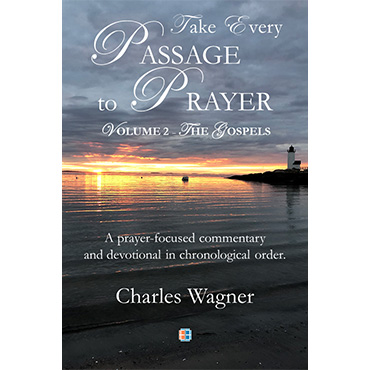The Gramazin Blog

Jesus, the Good Shepherd, Heals a Blind Man
Take Every Passage to Prayer - Volume 2, The Gospels
Monday August 12, 2024
John 9:1-10:21
Father, please help me not to be a coward. I want to stand side-by-side with You in ministry. Help me not to fear man. Please give me confidence and courage to challenge lovingly and skillfully all who question the gospel of Jesus Christ. Father, I don’t know why others may suffer. Help me not to judge them. Instead, please help me to show compassion upon them. Help me to do the good works You have called me to do while there is still time to do them. Father, You may answer my prayers in ways I can’t make sense of. Help me to trust that You know what You are doing and to have total faith in Your goodness. Father, give me a spirit that celebrates the miracles You perform. If an alcoholic is saved from his alcoholism, help me to celebrate with Him and, therefore, glorifying You. Father, I don’t want to be spiritually blind. Help me to know who You are, who I am, and what the gospel means to me. Please also use me to open the eyes of those who are spiritually blind. Help me to be a good shepherd and lead people to the place where they are walking with You in the light of the gospel and where they have been transformed by the Holy Spirit. Amen.
Father, Jesus is now walking along a road with His disciples. Wait a minute. Where did they come from? In the previous passage we learned that Jesus had an intense debate with His adversaries in Jerusalem. There was no mention of His disciples whatsoever. Wouldn’t they side with Jesus in the debate? Wouldn’t they rally around Him and defend His cause?
No. The same men who will abandon Jesus at the cross were on the scene but, I surmise, were too afraid to take a stand for Jesus when He was confronted by the authorities and people in Jerusalem. Now that Jesus is safely away from His persecutors, the disciples rejoin Jesus. Jesus would have been justified to say sarcastically, “thanks for the support, boys.” I can imagine an uncomfortable silence as they walked down the road. Everyone in the ensemble knew the disciples had stepped to the back of the crowd but no one wanted to talk about it.
They came across a man who had been blind from birth. The disciples did the same thing we do in the 21st century. They imagined the man suffered with blindness because of either his own sin or the sin of his parents. For many self-righteous people, sin is the only explanation for another person’s suffering. They asked Jesus whose sin had caused the blindness.
There are many reasons for suffering that have nothing to do with sin.
- We live in a broken world. People are diagnosed with cancer not because they have sinned but because disease entered into this world the moment Adam and Eve sinned. Sometimes we suffer not because we have sinned but because the human race, to which we belong, has sinned and earth, as well as our physical bodies, have been corrupted because of that sin.
- Suffering draws us into a personal relationship with You, Father. It is only through suffering that we realize that we need to walk with You throughout each hour of our life. A man who thought he had all the money he could ever need now realizes he needs You when all of his money is lost in a stock market crash. Without the security of his wealth, he has no choice but to cry out to You for help.
- How can we model the fruits of the Spirit unless we do so in the context of suffering? Courage is only discernible when there is something for someone to fear. Genuine faith can only be admired when there is no evidence for deliverance from suffering. Love is glorified when the world believes we have every reason to hate an enemy who is oppressing us.
- Suffering is essential to ministry. How can we minister to someone who has experienced a severe loss unless we had previously experienced a similar loss ourselves? Cancer survivors can relate the most with cancer patients. Those who previously suffered through an extended period of unemployment have the most credibility with someone who is unemployed.
- Suffering is often the price we pay for ministry. Jesus suffered tremendously in life because He was in full-time ministry. He could have retired and gone back to being a carpenter in Nazareth. However, He knew His purpose was to serve You and that those who serve You suffer in a world that hates You and Your ways. A doctor leaves behind his practice to go serve on the mission field where he contracts a fatal disease. However, before he died, he touched many lives for Christ.
- Suffering enables Jesus to show His love to us. Jesus is the author of compassion, kindness, and empathy. He loves to demonstrate and exercise these traits. How can He be compassionate unless we are in need? How can He show kindness unless we are in need? How can He show empathy unless we are in need? How can He comfort us if we don’t need to be comforted? How can He wipe away our tears unless we had something to cry about? Jesus expresses Himself through the beauty of loving family members, friends, and counselors who lift us up in seasons of hardship.
It is with these truths in mind that Jesus said to His disciples that neither the man’s sin nor his parent’s sin had caused the man’s blindness. Jesus then gives us a seventh reason for suffering.
- Suffering enables Jesus to perform miracles. The simple fact of the matter is that we would not have the account of Jesus healing a blind man if there was not a blind man who needed to be healed. What is required for us to know that Jesus can miraculously heal people? We need to have people who have things they need to be miraculously healed from. Conditions that call for a miracle are necessary for the miracle to occur. Father, You would not have been glorified parting the Red Sea if the Israelites had not been trapped and surrounded by the armies of Pharoah. You would not have been glorified by Jesus calming the storm on the Sea of Galilee if there had not been a storm on the Sea of Galilee.
Jesus established that the blind man was not blind because of sin. He then moves on to make an important point: if believers fail to do good works to help people in need, they are the ones who have committed a sin. Father, Jesus said “we” (the church) must do the good works You have assigned for us to do. There will come a time when it is too late to do good works.
Night is coming, when no one can work. While I am in the world, I am the light of the world. (NIV)
Jesus is still in the world today, though His physical body ascended into heaven 2,000 years ago. He continues to draw people to Himself, preparing them for ministry, and then sending them out to touch lives. He continues to be the light of the world. However, there will come a time when it is too late for ministry. There will be no hope for the lost after the second coming of Christ. It will be night for them and for our ministries.
Having established there was urgency to bring healing to the blind man, Jesus set out to do just that. He spit into the dirt, made mud with his saliva, and put it on the man’s eyes.
Say what? He did what?
Our first reaction in the 21st century is to say, “ew!” However, we must do our best to put ourselves into the shoes of a blind man in the 1st century.
- How does a blind man feel something has been done to his eyes? He cannot see what Jesus is doing. His sense of touch needs to be engaged and, therefore, something needs to be applied to his eyes. There was no cream or gel at a pharmacy that Jesus could purchase and apply to the man’s eyes.
- Classical writers such as Celsus, Galen, and Pliny all wrote of the medicinal properties of saliva. Those who witnessed Jesus applying spit to the man’s eyes were not “grossed out”. They saw it as a valid medical treatment.
- In our most recent discussion, Jesus debated with the religious authorities at the temple about His legitimacy. It was widely held at the time that it was only the spit of a legitimate firstborn heir that had medicinal attributes. Jesus is establishing that He is the legitimate Son of God by performing the miracle the way He did.
- Jesus does not follow convention when He works in this world. We think the best way for Him to answer our prayer is for A, B, C, D, and E to happen consecutively. Jesus may answer our prayer by doing X, M, P, A, G, U, and F. Which one of us would expect our prayer for eyesight to be answered by Jesus spitting into the ground, creating mud, and then applying it to our eyes? He doesn’t do things the way we think He should. He is the Son of God.
Jesus told the man, and I presume the man’s associates who were guiding him, to go to the Pool of Siloam and to wash his eyes. The text tells us that the man obeyed Jesus and returned to his home that night able to see.
His friends and neighbors couldn’t believe it. Literally. They thought this must be a fraud. The only explanation was that someone with eyesight was posing as the blindman. However, the man was able to prove that he was the man who had been blind. They asked him how he had his eyesight restored. He explained what happened by detailing his encounter with Jesus on the Sabbath.
The blindman’s family, friends, and neighbors asked him where they could find Jesus. He said he didn’t know. Why did they ask that question? We get a hint in verse 22 when it is reported that the blindman’s parents were afraid of the religious leaders. They were frightened that Jesus had healed their loved one on the Sabbath and that, therefore, their loved one would also be accused of breaking the law for having dared to be healed on that holy day. If they could locate Jesus for the authorities, they would gain the favor of the authorities who would then leave their loved one alone. They decided to plead their case before the Pharisees without knowledge of where Jesus was. The text tells us that they took the formerly blindman to the Pharisees. In a private conversation with the Pharisees, the man was a faithful witness to the power of Jesus, sharing his testimony in detail of how Jesus had restored his eyesight.
Father, just as the blind man’s family had anticipated, the Pharisees ignored the miraculous healing of the man and instead cast judgement upon Jesus. They didn’t care about the man’s deliverance from suffering by Your love and power. There was no compassion or grace. They only cared about 100% compliance to the “law”. They accused Jesus of being a sinner because He had healed on the Sabbath. Since Jesus had allegedly sinned, He could not be from You and, therefore, His life, ministry, and message were negated.
They asked the formerly blind man for his opinion. Instead of calling Jesus a sinner, the man called Jesus a prophet. The Pharisees were not pleased with his reply. They thought that the man was somehow conspiring with Jesus and that the man had never been blind. The religious leaders called for the blind man’s family to join them.
“Is this guy really your son?” “Yes.”
“You say he was born blind.” “Yes. He was born blind.”
“Why isn’t he blind now?” “We have no idea. He’s an adult. Ask him yourself.”
The text describes how the parents were too afraid of the Pharisees to tell them the truth, which was that Jesus had performed a miracle. In their fear of what the Pharisees could do to them, they:
- Refused to share the gospel, that the Son of God was walking among them, healing people, and preaching salvation and repentance. They won’t talk about who Jesus is.
- Refused to share their testimony of what Jesus had done for their son. They won’t talk about what Jesus has done for them.
They were afraid of the consequences of sharing their faith. We read in the text that the family feared that they would be banned from the synagogue and, therefore, socially ostracized. In 21st century lingo, they would be “cancelled” and the effects of it would be financially devastating. In other words, the family of the blind man behaved like many believers in the church today. Many believers go through their lives afraid of persecution and, therefore, avoid sharing the gospel with anyone.
Once more the blind man was summoned to stand before the Pharisees. He was commanded to tell the truth that Jesus was a sinner for having healed on the Sabbath. The man said it was not his place to judge Jesus, but what he does know is true is that he was blind, and Jesus healed him. The Pharisees asked him to recount the miracle again.
“Why are you asking me to tell the story again? Are you considering being His disciple too?”
The Pharisees were furious with the man. Not only had he just confessed to being a believer in Jesus Christ, but he was also insinuating the Pharisees should consider humbling themselves and following Jesus as well. Showing the true nature of their wicked hearts, the Pharisees hurled insults at the man. They charged the man with being stupid, choosing to become a disciple of some unknown man while they, on the contrary, are the disciples of Moses.
Father, the man had incredible courage and gall. He castigated the Pharisees for being dumb enough to ignore the obvious: the only way he had been healed was by You and if Jesus was godly enough to be Your agent for that healing, Jesus is obviously from You and working with You. The man shared with us a critical doctrine of huge significance to us in the 21st century: without God we can do nothing.
The Pharisees had no response other than to accuse the man of being a great sinner. They cast him out of their presence. Word got around town that the Pharisees had cast a man, and his family, out of the temple.
Father, we learn an important lesson in this passage: Jesus searches for, finds, visits with, and comforts anyone who is persecuted for their faith in Him. The text suggests Jesus found the blind man.
“Do you believe in the Son of Man? ” Jesus asked.
“I’m not sure but I want to believe in Him. Please tell me who He is.”
“I, the one you are speaking to, am He.”
The formerly blind man had seen enough. He had plenty of evidence that Jesus was from You, Father. Now that Jesus has just proclaimed that He is the Son of Man, the man professed his faith in Jesus, by saying “I believe”, and then worshipped Him.
Apparently, the Pharisees had once more encircled Jesus as He was talking to the formerly blind man. Knowing who was listening to Him, Jesus had a message for the Pharisees. There are two kinds of blindness:
- Physical blindness. The person cannot see light, color, or shapes. The physical world is dark to them. They need assistance to navigate their steps throughout life.
- Spiritual blindness. The person cannot grasp who God is, who they are, why they need a savior, and what repentance and service to God really look like. Spiritual eyesight includes conviction, confession, and repentance.
Jesus has come to heal those who know they are spiritually blind and want to be healed so that they can walk in the light with Him. Jesus has not come to heal those who know they are spiritually blind but do not desire to walk with Him.
The Pharisees asked Jesus if He was calling them spiritually blind.
“Yes,” Jesus replied. “And you know you are blind and that makes you guilty.”
Jesus then sets out to prove the blindness of the Pharisees.
The true shepherd approaches his flock by entering through the main gate. The false shepherd approaches the flock by climbing over the wall and stealing the sheep from the pen. | Genuine shepherds in the church having nothing to hide. They are not deceitful. They do not disguise or mask their intentions. They don’t do things in darkness or exploit people’s vulnerabilities. | The Pharisees and religious leaders were deceitful. They disguised their intentions. They operated in darkness and exploited people’s vulnerabilities. |
The true shepherd’s voice is recognized by the sheep. He knows each one of them and they trust him and follow his commands. They will never follow a stranger. | Genuine shepherds in the church build relationships with the body of Christ. They know their brothers and sisters and are known by them. They build trust that what they say and do are doctrinally correct and the people follow them. | The Pharisees didn’t build relationships with people. They didn’t build trust. Instead, they were bullies going around with metaphorical clubs beating the people into submission. |
Jesus is the gate for the sheep. All who enter through Him will be saved and enjoy pasture and life fulfillment. The thief only comes to steal, kill, and destroy. | Genuine shepherds in the church rescue people and lead them to a safe place where they are feeling fulfilled, walking each day with Jesus Christ. | The Pharisees came only to steal the joy from others (such as the celebration of the blind man’s healing). They desired to destroy the man’s faith in Jesus. They also killed the reputation of the man’s family by casting them all out of the synagogue. |
Jesus managed to glorify Himself while at the same time cutting the Pharisees down to size. He did so without directly criticizing them. He simply described what His leadership looks like as the Good Shepherd. When juxtaposed against that, the Pharisees looked like inferior leaders. They also looked clueless and blind.
The text concludes that half of the people thought Jesus was demon-possessed or suffering from mental illness. The other half thought that He made sense and that the only explanation for His ability to heal the blind man was that He had been sent by You, Father. This remains true this day – some people think the gospel of Jesus Christ is insanity and needs to be marginalized, if not exterminated, from our society. Others find meaning, purpose, deliverance, and transformation through that gospel. Amen.
Jesus was called “Rabbi” by His disciples in this passage, which means teacher. He is referred to as Rabbi sixteen times in the gospels (four times in Matthew, four times in Mark, and eight times in John. Jesus instructs His disciples in Matthew 23:7-9 that only He is to be called Rabbi. To Jesus, the word “Rabbi” is a special title that is deserved only for the one who has come from God to reveal the will of the Father to mankind. I suggest Jesus was pleased when they called Him “Rabbi” in this passage.
While the Bible does not record such a temptation, it is reasonable to conclude that Satan tempted Jesus with the idea to return to His carpentry work and Satan would stop persecuting Him. A weary and exhausted Jesus was clearly vulnerable to such a temptation. However, He never sinned.
How could the man’s sin have caused his blindness? John has already told us that the man was blind from birth. His blindness was already established before he took his first breath in life and then subsequently sinned.
Our opportunity to touch lives for Christ only lasts until our final breath. Death brings nighttime to our individual service to the Kingdom of God in this broken world. It is also true that at some point in the life of a prospering ministry persecution will come. It will become more difficult to do the good works our hearts long to do.
This was not the only time that Jesus used spit in a healing. In Mark 7:33, Jesus spit onto His fingers and then touched a deaf man’s ears to bring healing. In Mark 8:23, Jesus spit into the eyes of another blind man to bring about his healing.
Nehemiah repaired the walls of this pool in Nehemiah 3:15. This pool was also referred to in Luke 13:4. Apparently there had been a well-reported disaster when the tower at the pool fell and crushed people. If that accident happened within a year or two before this healing, imagine what Jesus was asking of the blind man: go in your blindness to a place where a tower fell and crushed many people. It was literally an act of blind faith for the blindman to trust his safety to Jesus. The pool was located on the southern slope of Jerusalem and the waters were fed by the Gihon spring. The Gihon spring was referred to in 2 Chronicles 32:20 and 33:14.
It is safe to say that Jesus did not give the man His business card with the address as to where He was staying in Jerusalem. Jesus foreknew that the blindman’s family would intend to turn Him in to the authorities. Jesus was adept at disappearing from the grid, in 21st century lingo, when He needed to.
The Greek word for prophet is “????????”. The word is used to describe someone who is a messenger from God. This person reveals the hidden things of God. The word is also used to describe the Messiah foretold in the OT. This person is an evangelist, sharing the means by which a person’s relationship with God can be restored. Such a person is moved by the Holy Spirit. In other words, the blind man was saying that, at the very least, Jesus was favored by God and on a mission given to Him by God. The formerly blind man is now a believer.
This was no doubt an attempt to catch the blind man in some inconsistency in his testimony. If the man changed any minute detail of the story the Pharisees would jump on that as evidence the story was a lie.
The word “too” is evidence that the formerly blind man had just confessed that he was a believer in and a disciple of Jesus Christ.
We read in this text that God listens to the godly person who obeys Him. That should be great incentive for those who want their prayers answered to live an obedient life before God.
It remains true in the 21st century – when people have lost the debate, when they are proven wrong by evidence, logic, and reason, they resort to pure emotion. “You are wrong because I feel you are wrong, and I want you to be wrong."
It is not newsworthy that the Pharisees got angry and threw a man and his family out of a meeting. It is newsworthy if the Pharisees cast the same out of synagogue membership altogether. It seems reasonable to conclude that Jesus wanted to find the man and comfort him because the consequences for the man having witnessed to the glory and authority of Jesus were so severe.
This is one of many millions of examples throughout history where people suffer the consequences of fearing what people can do to them. The family tried to appease the Pharisees but ended up suffering the consequences they had tried to avoid. Fear of man is a trap that causes us grief every single time. Proverbs 29:25.
The Greek word for found is ???????. The definition of the word suggests two truths. The first truth is that Jesus met up with the formerly blind man. Jesus may have known where the man was and didn’t need to search for him. However, He still had to walk to where the man was. Consider the word “found” as the word “arrived at”. The second truth is that Jesus wanted to know the man’s character and soul. Was the man’s faith real? Jesus may not have been so much searching for the man as He was searching for the man’s soul.
Jesus refers to Himself as the Son of Man in this passage. In Matthew 16:16-17, Jesus identifies Himself as the Son of God. He also identifies as the Son of David in Luke 18:38-41. These three titles express three different offices for Christ. As the Son of Man, He is the prophet the communicates the will of God that all will be saved through the sacrifice of Jesus on the cross. As the Son of God, Jesus is identifying Himself as being one with God. As the Son of David, Jesus is identifying Himself as the King of kings, the ruler of all.
Jesus is confirming what the blind man first reported to the Pharisees. That Jesus is the Son of Man, a prophet sharing a message of salvation through Jesus for all the world to hear.
One can infer from this passage that those who are unaware of their spiritual blindness are not judged. This is an individual who does not know they are disobeying God’s commands. Think of a little child or an adult with a mental capacity insufficient to wrestle with morality.
Jesus asserts that not only does He lay down His life for the sheep, but He also resurrects His life after His death. There has been debate among Biblical scholars if God the Father raised Jesus to life after Jesus’ death or if Jesus did it Himself. This appears to be a statement by Jesus, that He has authority to take up His life again, that He will raise Himself back to life on the third day.







